Our Blogs
Wonder Woman: Reeba Cherian Dark-skinned, Flamboyant, and Confident
I have known Reeba Cherian all my life and I have been a passer-by in many of her experiences in India. Growing up in Trivandrum, I met her often when she came to visit her brother. I was also around when her marriage was being fixed. Then she got married to Sam and moved to Coonoor. A few years later, I got married to Mohan in Coonoor and followed her there. She was my only aunt in the vicinity and someone I knew I could reach out to at any time. Her husband’s family and my husband’s family were also close, so we had one more connection, and I passed through many of her Coonoor stories too. She has always stood out as a wonder woman to those of us who know her. Her smile, warmth, and vibrant personality don’t betray the scars from her traumatic childhood.I have known Reeba Cherian all my life and I have been a passer-by in many of her experiences in India. Growing up in Trivandrum, I met her often when she came to visit her brother. I was also around when her marriage was being fixed. Then she got married to Sam and moved to Coonoor. A few years later, I got married to Mohan in Coonoor and followed her there. She was my only aunt in the vicinity and someone I knew I could reach out to at any time. Her husband’s family and my husband’s family were also close, so we had one more connection, and I passed through many of her Coonoor stories too. She has always stood out as a wonder woman to those of us who know her. Her smile, warmth, and vibrant personality don’t betray the scars from her traumatic childhood.
Here’s to Fit the Soul’s Wonder Woman of August, Reeba Cherian!
The following interview with Shalomie Tewes was originally published on The Pigment Nation’s blog. It has been lightly edited for length and clarity.Images are courtesy:Reeba Cherian.
Shalomie Tewes: I’ve waited so long to discuss your story. This is exciting—tell me everything!
Reeba Cherian: I am a dark-skinned Indian who was born and brought up in Singapore. My father was the Superintendent of Police in the Singapore Police Force, and my mother an efficient homemaker. I studied in Singapore from kindergarten to Class 3 and during that time I went through severe discrimination because of the colour of my skin.
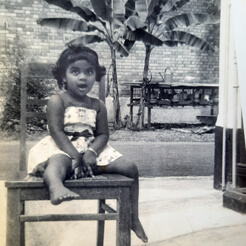
Most of my classmates were fair-skinned Chinese and Malay children. I was the only dark-skinned child in my class. My classmates never called me by my name; I was addressed as ‘black pig’ or ‘dirty pig’. My desk and chair in class were kept a little apart from the others.If any of my classmates forgot their pencil, ruler, or eraser, and had to borrow something from me, they would place a handkerchief on their palms and ask me to keep the item on the handkerchief.
They didn’t want to touch me, and they rarely let me play with them.Skipping rope games were popular in those days and if by chance they needed someone to hold one end of the skipping rope, they would ask me to join. But if somebody else came along, they would ask me to leave. My Chinese or Malay substitute would wipe the handle of the skipping rope before holding it.During break time, my classmates would play on the swings and the seesaws. When I went to join them, they would jump off and walk away. So I often ended up playing alone.
At the time, I was too small to feel lonely.I just kept wondering why the other children avoided me and why they wiped the things that I had touched.
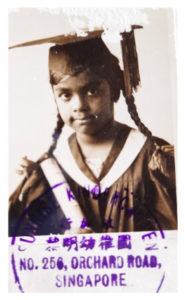
ST: Did you ever talk with your parents or other adults about these experiences?
RC: No, I didn’t know how to confide in anyone. I just bottled everything up and became stubborn and a rebel. I built up a defensive mechanism to survive.
ST: I’m so sorry you had to go through all of this. I can’t imagine the trauma.
RC: It’s okay.It made me sensitive, caring, and loving. I always work to save the underdog now.
ST: How old were you when you came back to India?
RC: Nine years old.
ST: Did you experience any discrimination in India?
RC: I didn’t fully understand the extent of the discrimination I had experienced in Singapore until I moved to India and joined a school in Nagercoil, Kanyakumari District, Tamil Nadu. In India, most of my classmates had the same or darker skin colour. They welcomed me as one of them. They were enamoured of my accent and clothes. All my classmates wanted to be friends with me, and I was well loved.
Slowly, I began to understand that what I had experienced in Singapore was blatant discrimination, based on race and skin colour. As I got older, I grew angry—not just at my Singaporean classmates, but at the teachers who let that to happen to me. Why did they allow my desk and chair to be placed away from the others? It was their fault. They could have intervened, and things may have been different. Sadly, they did nothing and I was ostracised.
However, I had terrific parents who raised me to bestrong and confident.My sister, Reena, who is seven years older than me, has fair skin and is beautiful. Whenever we visited people in their homes in Kerala, they would ask my parents why Reena was so fair while I had turned out so dark.This continued into adulthood. But my parents were supportive throughout.
The next nightmare started when I reached 19 or 20—marriageable age. When marriage proposals started coming in (as per the custom of arranged marriage in India), they would inevitably fall through because I had dark skin. No one wanted a dark-skinned bride. For a friend or sister, dark skin was fine. But I was not good enough to marry. People don’t recognise a prospective bride’s good heart, talent, or education. I was also a singer, and I was smart and confident. But none of that mattered. If you have dark skin, you are ugly and unworthy of marriage. My parents sat me down one day and explained to me that the sad part about people from Kerala, where I am originally from, is that when they see a dark-skinned person, they automatically perceive that person as ugly. My parents assured me that it wasn’t my fault, but the side effect of a lousy, hurtful culture.
A couple of prospective grooms came to see me. I liked them and I think they liked me too, but they didn’t have the courage to stand up to their parents because the minute their parents saw that I had dark skin, they didn’t want to move forward with the engagement. And it’s not as if the grooms I saw were fair. They were all as dark as me, and some even darker. But they were worried that our children would also be dark, so they rejected me.
ST: I’m stunned and speechless. It’s unbelievable that anyone could do this to another person.But having grown up in India, I’ve seen instances of this kind of treatment too.
RC: Another thing that people talked about was the colour of my clothes. Most people would tell me that because I had dark skin,I should only wear clothes that were white, off-white, light brown, light green, and so on.But of course I was flamboyant! I loved magenta, purple, parrot green, and copper sulphate blue.
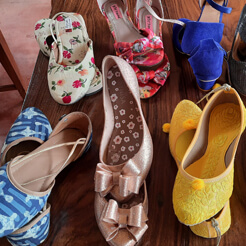
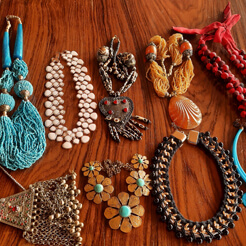
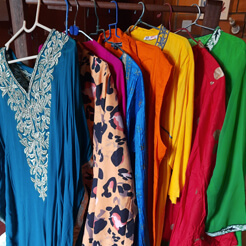
Reeba’s jewellery, clothes, and shoes.
My parents gave me the freedom to wear whatever I wanted. They said, ‘If you feel good wearing bright colours, you willcarry yourself with confidence’. So I grew up wearing all kinds of vibrant colours. Unfortunately, people thought that I was trying to seek attention.But that was just me expressing my individuality.
You see, growing up in Singapore, I was used to a wide range of styles and colours of clothing and shoes. These styles came to India only years later. In Singapore, I have memories of my sister’s fascination for matching footwear to her clothes. We grew up doing things like that. For all our outfits, we had matching sandals or shoes.But when we came to India, coloured footwear was not yet available.
Fast forward to about 20 years ago, at Diwali Night at one of our clubs. As you know, Diwali is the festival of lights and everyone wears brightly coloured clothes.I had a beautiful red and black salwar that I was all set to wear with matching jewellery. A few days before the event, I went shopping and found this pair of red sandals with flowers in the front and straps at the back. I was so excited—they were the perfect match for my outfit. So I bought them and wore them to the club, and they were such a big hit! All the young girls came and asked, ‘Aunty, where did you get those shoes from?They are so amazing!’
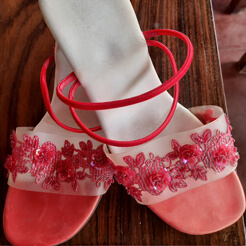
But of course a few people said, ‘She has worn those red sandals just for attention’. I was hurt by this at the time, but I eventually overcame it. Now, 20 years later, everyone is going to malls and buying shoes and sandals to match their clothes. So,if I was seeking attention back then, what are they doing now? I just smile and think to myself that I was way ahead of the curve.
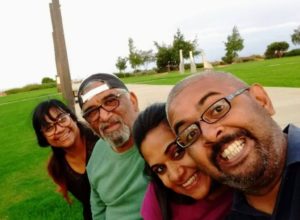
ST: Thank you so much for sharing your amazing story! Would you like to say something to the readers?
RC: My marriage, an arranged one, worked out marvellously in the end. Despite initial objections from his parents, Sam said yes to me. He claims it was love at first sight! I have been married to him for 37 years now. He has given me the freedom and space to grow, and I have evolved to become a successful wife, mother, grandmother, singer, and wedding planner. My fantastic family, wonderful friends, and loving and supportive community have all contributed to my success. My life is a testimony to it!
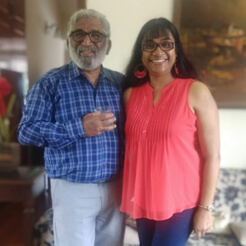
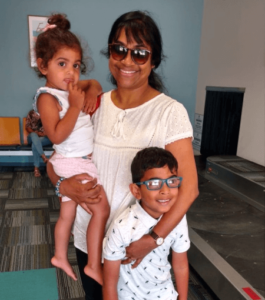
I hope my story inspires and encourages anyone who is discriminated against because of their skin colour or anything else. Don’t be bogged down by negativity. Always remember that you are precious and worthy of living. God bless!

Suggested Blogs
Get in touch with us
Be the first to hear about our upcoming programs












